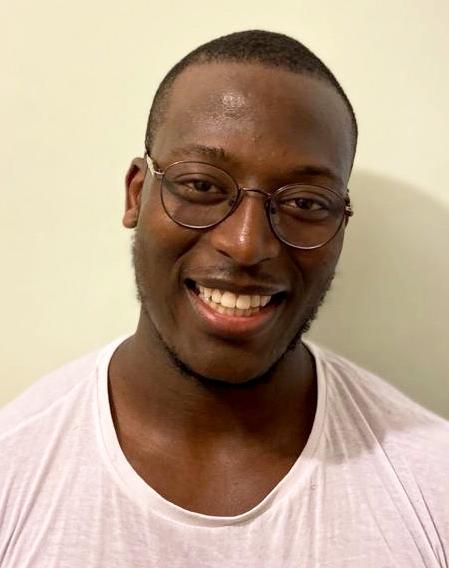Benjamin Fadele
MEng (Hons) Chemical Engineering
Aftertreatment Integration Test Engineer, Cummins Emissions Solutions, Darlington

Why did you apply to the University and why did you choose that course?
After visiting several potential universities, I made a firm decision on Bradford mainly due to the emphasis placed on community through ‘TEAM BRADFORD’. I felt a strong sense of togetherness and saw how students had a strong sense of pride in the university.
I particularly liked the Chemical Engineering Department due to the support that the Department had to offer. Examples of this is the open-door policy that runs within the department, maths workshops etc. The Department is also fairly small, so it is very close-knit, therefore you get to know your lecturers and they become really accessible to you. Furthermore, it also means you are recognised a lot more for your contributions to the University and Department compared to other places.
I wanted to study chemical engineering due to the versatility of the degree and the flexibility it gave me career-wise due to the skills I gain on the course. Personally, my satisfaction comes from problem solving, working with diverse groups of people with different skillset to solve complex problems and championing sustainability and innovation. The Chemical Engineering course at Bradford allows me to do this, through the range of group projects and individual projects undertaken throughout the degree course.
What action did you take to improve your employability whilst at University?
Through the many careers talks offered at the university, I realised that many employers value students who have taken up ‘Positions of Responsibility’ and who are able to talk about how the skills they have gained will be beneficial in their placement roles. Therefore, I joined various societies and sports groups, taking up positions of responsibility in the Chemical Engineering Society, for example. Furthermore, I became a Student Ambassador and Student Representative, as well as helping with various university campaigns. These roles helped me build soft skills which employers are looking for e.g., teamwork, presenting to large groups, money management, project management, taking initiative, etc.
In addition, I also attended presentations from the Career and Employability Services Team, which went through writing cover letters and CVs, Psychometric tests and how to ace assessment centres and interviews. These allowed me to gain the skills to structure and tailor my applications and effectively prepare for assessments centres, as I was aware of what employers were looking for.
How did Career and Employability Services and placement staff support you during your time at university?
Besides attending the weekly pre-placement sessions (timetabled specific to the faculty), I was able to book meetings with Career and Employability Services staff, most notably the link Faculty Career Consultant, who was able to give a detailed review of my CVs and cover letters. She gave me tips on how I could make my applications stronger and stand out. Furthermore, as I advanced through the application stages, she also provided resources (available on FEI Pre-Placements CANVAS), which I could go through which subsequently helped with interviews and assessment centres, in addition to conducting mock interviews and going through my CV like an employer would!
In addition, the Faculty Career and Employability Services Team also provide drop-in sessions where you could discuss progress with job applications, CV reviews and general support with placement applications.
Use the STAR/CAR/SBO techniques when answering questions or doing applications. On top of that, I would always add what I have learnt from the experience and how I can apply that within the job.
Tell us about your placement.
I have been offered a placement as an Aftertreatment Integration Test Engineer, with Cummins Emissions Solutions in Darlington (starting July 2021). Aftertreatment technology is a vital component in the diesel engines; an aftertreatment system is used to reduce harmful exhaust emissions from internal-combustion engines to meet emissions regulation.
My primary responsibilities will include writing test instructions, interpreting tests results and prepare necessary tests scripts ensuring engine, aftertreatment and all hardware is set up and available for testing. I will also be responsible for overseeing test cell operations and supporting the operators answering any questions, troubleshooting, and solving problems they may encounter while testing. I will also be responsible for inventory management of prototype equipment onsite or offsite.
What advice would you give to current students about finding placement (and work experience) opportunities?
- Apply as early as you can. I started applying for placements after my first year (very early in my second year). Although I made it through to interviews/assessment centres, I was not successful in getting a placement. However, the experience I gained was invaluable when applying for placements in my third year, as I was very aware of what employers were looking for now. Therefore, I was able to craft quality applications, rather than focus on quantity and was able to secure 2 job offers out of 3 interviews. Experience is the best tool for success!!
- In your applications and interviews/assessment centres, demonstrate how you can personally add value to the business whether that is through your soft and interpersonal skills or using your technical knowledge.
- Where applicable, use the STAR/CAR/SBO techniques when answering questions or doing applications. On top of that, I would always add what I have learnt from the experience and how I can apply that within the job.
- Get your CVs and cover letters checked by the Faculty Career and Employability Services Team.
- Use LinkedIn and see what people in the position do in their roles and what their interests generally are. As a result, when you talk about the role in interview, you can potentially give a bit more beyond what you have read in the job description and ask more detailed questions which would make you come across as very enthusiastic and passionate.
- Finally, I would recommend that you attend the focused, faculty pre-placement sessions and enrol on the FEI-Pre-Placements CANVAS to access various placement opportunities, webinar recordings and resources.
